
Related
Guests
- Tavis Smileythe host of Tavis Smiley on PBS and The Tavis Smiley Show from PRI. He is also co-host with of Smiley & West from PRI with Dr. Cornel West. Tonight he is hosting a nationally televised discussion at George Washington University titled America’s Next Chapter
Links
- Democracy Now! Complete Coverage of the Tucson Shooting
- Tavis Smiley Late Night on PBS
- The Tavis Smiley Show on PRI
- Smiley and West Radio Show: Travis Smiley and Dr. Cornel West
- “MLK: A Call to Conscience", Episode 2 of Tavis Smiley Reports
- "America's Next Chapter." January 13, 2011 Discussion Hosted by Tavis Smiely
We get reaction to President Obama’s memorial speech in Tucson from journalist Tavis Smiley. “I thought the speech the President gave was a wonderful speech, and I thought it properly contextualized what it is that we are up against as a nation,” Smiley says. “I wish the President had gotten around to giving this speech a year ago.” And on this eve of the birthday of Rev. Martin Luther King, Jr., who decried violence abroad and at home, we also play excerpts of his historic 1967 address at the Riverside Church, when he called for an end to the Vietnam War. Smiley is hosting a nationally televised discussion tonight titled, “America’s Next Chapter.” [includes rush transcript]
Transcript
AMY GOODMAN: Joining us now in Washington, D.C. is Tavis Smiley, the host of Tavis Smiley on PBS and The Tavis Smiley Show on PRI. He’s also co-host of Smiley & West with Dr. Cornel West. Today he’s hosting a nationally televised discussion at George Washington University titled “America’s Next Chapter.” We’ll go to break and then rejoin Tavis Smiley.
[break]
AMY GOODMAN: We go to Washington, D.C. to speak with veteran broadcaster, award-winning journalist, Tavis Smiley.
Tavis, welcome to Democracy Now! A very grim week. Your response to what has taken place in Tucson?
TAVIS SMILEY: First of all, Amy, always a blessing to be on with you. Thank you for the opportunity.
Clearly, I think every American shares in this feeling of angst, anger even, and certainly sadness about what happened in Arizona, and I’m so glad to see that the community came together last night. I thought the speech the President gave was a wonderful speech, and I thought it properly contextualized what it is that we are up against as a nation, where incivility in our media, in our politics, and life in general, where that incivility is concerned.
I wish the President had gotten around to giving this speech a year ago. One of the high points — or I should say one of the low points — in incivility in this country was just a year or so ago, when Congressman Wilson stood up on the floor of the House during the President’s speech and said, as we all recall, “You lie!” The President moved right past that and, you know, as he should have, accepted his apology, but he moved past it so quickly that he didn’t take that moment to usher us as a nation into a conversation about civility. I wish he had done that then. I’m not suggesting that this tragedy might not have happened as a result of that, but we would already have been involved in this conversation about civility in this country, and we would have had a jump-start on last night’s speech, so to speak.
So as it turns out, the President, I think, gave a wonderful presentation last night, but I wish that we had started this conversation a year or so ago. And in that regard, we want a president that will lead us, not follow public opinion, not follow public sentiment. By the time the President got around to giving this presentation last night, for days now the country has been engaged on its own in this conversation about the lack of civility in our body politic. But again, all things considered, a great speech by the President last night. I’m glad he finally got around to giving those remarks, Amy.
AMY GOODMAN: Well, the event that you’re hosting tonight, “America’s Next Chapter,” is certainly now taking place in a different context than when you planned it. Can you talk about what you see as America’s next chapter? And I think this week certainly will turn a new page, perhaps a new chapter, write a new book.
TAVIS SMILEY: There’s no doubt about the fact that this tragedy is going to obviously impact the conversation that we had planned tonight some time ago. What makes this conversation unique — and I think, quite frankly, propitious, Amy — is that we rarely have conversations that are multicultural, multiracial, multiethnic and multi-ideological. Imagine a conversation that includes Asian, Hispanic, white, black, Republican, Democrat. That’s what I have the honor to moderate tonight on C-SPAN live from 6:00 to 9:00 Eastern on the stage at Lisner Auditorium at George Washington University. So, as you mentioned, it’s called “America’s Next Chapter: Is There a Brighter Future for the Next Generation?”
There was a Rasmussen Report, that you probably saw, that came out some days ago that found, Amy, that almost half of the American citizenry — almost half of the American public — thinks that our best days as a nation are behind us. And these kind of tragedies, I think, add to that angst, add to the reality that so many Americans feel about the fact, again, that our best days as a nation might very well be behind us. And so, this conversation this evening is designed to take this question head-on about how we write America’s next chapter.
And again, the timing could not be any better. This tragedy impacts this conversation tonight. A new Republican-controlled Congress impacts this conversation tonight. President Obama now almost at the halfway point of his first term, that impacts this conversation. In a few days, his State of the Union speech will impact this conversation. Tomorrow, I think, is the vote on the new chair of the Republican National Committee; the first person of color to head that party may be out tomorrow. And certainly, weeks from now, we’re going to see Republicans and others start to line up and publicly declare that they’re running for the White House a year from now. So the timing, again, could not be more propitious, and we accept the challenge tonight to have a conversation. For about three hours, we get a chance to really drill down on this subject matter tonight at George Washington University on C-SPAN.
AMY GOODMAN: Today, we would have been talking about the vote that was scheduled to take place yesterday in the House of Representatives to repeal Obama’s healthcare plan, but the House has decided to put off all of this — all this voting until next week, in honor of dealing with what happened in Tucson. But I wanted to play for you, Tavis, what Sarah Palin had to say. On Wednesday, the former vice-presidential candidate made her first extended remarks about Saturday’s shooting. Palin has been widely criticized for creating this map last year that placed gun crosshairs over the districts of 20 congressional districts, including Gabby Giffords’. She removed the map on Saturday after the shooting. Palin suggested that mention of her previous comments is, quote, “blood libel.”
SARAH PALIN: But especially within hours of a tragedy unfolding, journalists and pundits should not manufacture a blood libel that serves only to incite the very hatred and violence that they purport to condemn. That is reprehensible. There are those who claim political rhetoric is to blame for the despicable act of this deranged, apparently apolitical, criminal, and they claim political debate has somehow gotten more heated just recently. But when was it less heated? Back in those calm days when political figures literally settled their differences with dueling pistols?
AMY GOODMAN: That was Sarah Palin. Tavis Smiley, your response?
TAVIS SMILEY: Well, it’s easy to Monday morning quarterback. It’s easy now to take that image down off your website. It’s easy now to blame the media in this regard. I think, quite frankly, Sarah Palin gets far too much media attention in the first place. I never waste time on my show discussing Sarah Palin — TV or radio. And I’m glad you played the clip; I’m not saying that to cast aspersion on you in this moment. In this moment, that is, Sarah Palin ought to be wrestled with. But she gets so much more attention than she absolutely deserves on our national media, for reasons I quite frankly don’t understand. I don’t take her seriously as a candidate, don’t take her pronouncements seriously. And this is really all about a branding effort for Sarah Palin, and she’s making a lot of money doing it. I ain’t mad at her for that. American enterprise is thriving in this country; she’s taking full advantage of it.
Having said that, let’s wrestle with those comments right now for a second. I believe that Sarah Palin, again, takes the easy way out by simply blaming the media. There’s so much blame to go around here, starting with our elected officials. And I mean Democrats and Republicans. We could do this all day long. Dick Cheney, when he stands on the floor of the Senate and says to Democratic Senator Patrick Leahy of Vermont, we all famously recall, “Go 'F' yourself” — that’s the sitting vice president of this country at that time telling a United States senator, a committee chair, to “go 'F' yourself.” President Obama, on one of his interviews within the last year, said to a reporter that he wants to know whose “A” to kick. That’s the President, in a live interview, saying, “I want to know whose 'A' to go kick,” inside his own administration. I think that kind of language doesn’t add to civility in this country, Republican and Democrat.
The media certainly has a role to play in this. You can watch Fox News on any given night and listen to vitriol in their attack of MSNBC. And you can flip the channel and watch MSNBC with even more vitriol attacking Fox News. And CNN is caught in the middle trying to figure it all out.
But worse yet, the American people. I believe, Amy, that hate is spreading fastest in this country on the internet. And there are no civility police. There are no fact checkers. You can say anything. You can put anything out there. You can do it anonymously; you can be cowardly about it.
So there’s a role for government to play, there’s a role for the media to play, there’s a role for the American people to play, in trying to increase the level of civility in our discourse.
AMY GOODMAN: On that issue of the use of the term “blood libel,” many leaders in the Jewish community criticized Sarah Palin’s choice of words. Simon Greer, president of Jewish Funds for [Justice], said, quote, “The term 'blood libel' is not a synonym for 'false accusation.' It refers to a specific falsehood perpetuated by Christians about Jews for centuries, a falsehood that motivated a good deal of anti-Jewish violence and discrimination.” He said, “Unless someone has been accusing Ms. Palin of killing Christian babies and making matzoh from their blood, her use of the term is totally out of line.” Those the words of Simon Greer of the Jewish Funds for Justice. And I know that there is a group of people who are going to Fox today with 10,000 signatures calling for Glenn Beck to be removed.
But Tavis, before we wrap up this discussion, we’re speaking today on the eve of the federal holiday that honors Dr. Martin Luther King’s birthday. Last year, we had you on just before your broadcast of the special about Dr. Martin Luther King called MLK: A Call to Conscience. This was one of the clips, one of the most famous clips of Dr. Martin Luther King’s speech that he gave on April 4th, 1967, here in New York at Riverside Church a year before — a year to the day before he was assassinated.
REV. DR. MARTIN LUTHER KING, JR.: I come to this magnificent house of worship tonight because my conscience leaves me no other choice. A time comes when silence is betrayal. That time has come for us in relation to Vietnam.
CLAYBORNE CARSON: Martin Luther King knew, when he gave that speech, that it would set off a firestorm.
SUSANNAH HESCHEL: It’s the speech that challenges us, and in that sense, it’s his most important. That we are uncomfortable with that speech tells us something.
REV. DR. MARTIN LUTHER KING, JR.: Why are you speaking about the war, Dr. King? Why are you joining the voices of dissent? Peace and civil rights don’t mix, they say. Well, such questions mean that the inquirers have not really known me, my commitment or my calling. Indeed, their questions suggest that they do not know the world in which they live.
VINCENT HARDING: It was precisely one year to the day after this speech that that bullet, which had been chasing him for a long time, finally caught up with him. And I am convinced that that bullet had something to do with that speech.
AMY GOODMAN: That was Vincent Harding, who helped write that speech for Dr. Martin Luther King on April 4th, 1967, that he delivered at the Riverside Church, calling for an end to the war in Vietnam.
REV. DR. MARTIN LUTHER KING, JR.: As I have walked among the desperate, rejected and angry young men, I have told them that Molotov cocktails and rifles would not solve their problems. I have tried to offer them my deepest compassion while maintaining my conviction that social change comes most meaningfully through nonviolent action. But they ask, and rightly so, “What about Vietnam?” And I knew that I could never again raise my voice against the violence of the oppressed in the ghettos without having first spoken clearly to the greatest purveyor of violence in the world today, my own government.
AMY GOODMAN: “The greatest purveyor of violence on earth today, my own government.” Let’s go to a little more of Dr. King’s speech that day.
REV. DR. MARTIN LUTHER KING, JR.: A true revolution of values will soon look uneasily on the glaring contrast of poverty and wealth with righteous indignation. It will look across the seas and see individual capitalists of the West investing huge sums of money in Asia, Africa and South America, only to take the profits out with no concern for the social betterment of the countries, and say, “This is not just.” It will look at our alliance with the landed gentry of South America and say, “This is not just.” The Western arrogance of feeling that it has everything to teach others and nothing to learn from them is not just.
A true revolution of values will lay a hand on the world order and say of war, “This way of settling differences is not just.” This business of burning human beings with napalm, of filling our nation’s homes with orphans and widows, of injecting poisonous drugs of hate into veins of peoples normally humane, of sending men home from dark and bloody battlefields physically handicapped and psychologically deranged, cannot be reconciled with wisdom, justice and love. A nation that continues year after year to spend more money on military defense than on programs of social uplift is approaching spiritual death.
America, the richest and most powerful nation in the world, can well lead the way in this revolution of values. There is nothing, except a tragic death wish, to prevent us from reordering our priorities, so that the pursuit of peace will take precedence over the pursuit of war.
AMY GOODMAN: Tavis Smiley, if you would reflect on this less famous speech of Dr. King, not the “I Have a Dream” speech, but that speech he gave even against the advice of his inner circle, who said, “You will the support of the leadership in America that is supporting you on civil rights,” when he said, “I must deal with violence abroad, as well as violence at home.”
TAVIS SMILEY: And Amy, as you well know, he did. When King was gunned down on that balcony in Memphis a year to the day later, as you mentioned, after that speech, he was persona non grata in this country. Over 55 percent of black Americans had turned against their leader, Dr. King. Three-quarters of the American people — three-quarters of the American people — had turned against Dr. King. He was no longer on the list of the most admired Americans. So King dies, again, persona non grata on that balcony in Memphis.
Here we are now, days away from his actual birthday, January the 15th, days away from his holiday — and this year, as you know, is the 25th anniversary of the King holiday, that Ronald Reagan was forced to sign into law. He didn’t want to do it, had to do it, during his term in the White House — terms in the White House. When you hear that speech, it’s hard to even add anything more to it, because, at once, you see how courageous he was and how principled he was. It’s why, to this day, I regard Dr. King as the greatest American we have ever produced. I could argue with you on FDR, I could argue with you about Lincoln, but I regard Dr. King as the greatest American we’ve ever produced, because of his courage, because of his conviction, because of his commitment, because he was a truth teller. His life, in short, was about this: justice for all, service to others, and a love that liberates people. Justice for all, service to others, and a love that liberates people.
In that last clip you played, King talked about a revolution of values. How prophetic was he? How propitious is that call right now in this nation for a revolution of our values? And that’s why I celebrate what you do, Amy, on this program every day. You are, in the Kingian tradition, the most, I think, courageous voice on TV, the most courageous voice on radio, raising these progressive questions, challenging us to reexamine our assumptions —
AMY GOODMAN: Tavis?
TAVIS SMILEY: — to expand our inventory of ideas. And we’ve got to keep moving in that direction.
AMY GOODMAN: I wanted to go back, in the light of the shooting this week, to one more clip, and it’s President Bill Clinton —
TAVIS SMILEY: Sure.
AMY GOODMAN: — right after the Columbine massacre in 1999, when two student gunmen killed 12 students and a teacher and wounded 24 others. This is President Clinton.
PRESIDENT BILL CLINTON: We must do more to reach out to our children and teach them to express their anger and to resolve their conflicts with words, not weapons. And we do know we have to do more to recognize the early warning signs that are sent before children act violently.
To the families who have lost their loved ones, to the parents who have lost their beloved children, to the wounded children and their families, to the people of the community of Littleton, I can only say tonight that the prayers of the American people are with you.
AMY GOODMAN: That was President Clinton telling the young people of America violence is not the answer. Yet he was saying this against the backdrop of the U.S. bombing of Yugoslavia. And now you look at today, the same message to the young people of this country — violence is not the answer — against the backdrop of war. Your final comment, Tavis?
TAVIS SMILEY: That’s why I said a moment ago I celebrate your voice and your courage in raising these issues, again, to help us reexamine the assumptions we hold, helping us to expand our inventory of ideas and to look at the world through a different prism, to create a different worldview. It’s what this conversation tonight at George Washington University on C-SPAN is all about, trying to get us to wrestle with these critical questions. And presidents have to be held accountable. They are examples, too, and the hypocrisy so often has to be called out. And somebody has to have the capacity, the courage, to do just that.
My grandfather used to say all the time, “Tavis, so often, when all is said and done, more has been said than done. We’ve got to move beyond saying and not doing. We have to be compassion. We have to be love. We have to be kindness. We have to be those things that we want to see in the world.” And it’s just amazing to hear that clip from years ago and what we saw, heard last night — different time, different moment, but almost redux. And so, it’s got to be more than just about the words that we speak, but rather the deeds that we do.
AMY GOODMAN: Tavis Smiley, thank you so much for being with us, and we’ll link to all the information about your “America’s Next Chapter” that you will be involved with tonight, hosting a nationally televised discussion at George Washington University.

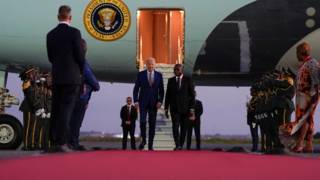

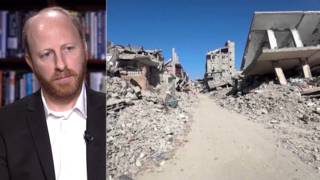
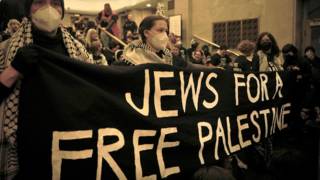





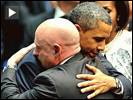
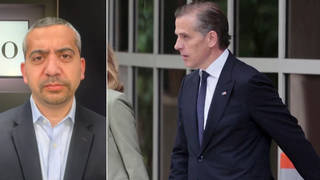
Media Options